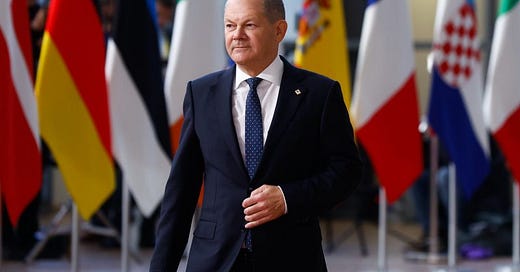In the news: Energy, the crux of war
The conclusions of the the first day of the Council meeting, the fate of the MidCat pipeline, and considerations whether to leave in the Energy Charter Treaty.
European Council latest
As I wrote yesterday, European leaders are currently meeting in Brussels. Although today’s talks will be centered around the conflict in Ukraine, the conclusions of yesterday’s exchanges are all about energy.
EU leaders asked the Commission to “urgently submit concrete decisions” on:
A voluntary joint purchase of gas
A new benchmark to reflect market conditions better
A temporary price corridor on gas transactions
A framework to cap the price of gas in electricity generation
Improvements to the energy market
Simplifying permits procedures to accelerate the deployment of renewables and grids
Energy solidarity measures
Measures to save energy
Mobilizing all relevant tools to improve the energy resilience of the EU.
Furthermore, Politico writes that “energy ministers […] will meet on Tuesday to discuss the plans further. After that, an emergency Energy Council is set to be scheduled for November to bring the plan into force.”
Although the meeting finished after 2 a.m. this morning, heads of State and government were unable to find a common position on the Commission’s proposal for an emergency cap on the price of gas.
Germany in favor of joint gas purchase, refuses EU market intervention
The measures are working. Energy prices are going down. The gas commodity price has come down to €120 per megawatt-hour, the lowest level since this summer.
Yet, this decrease fuels Germany’s skepticism about a Europe-wide intervention in the gas market such as the dynamic price cap proposed by the Commission earlier this week.
Instead of caps, “European interconnectivity” should be the focus, [German] officials say, amid worries over price caps driving up gas consumption. […]
Berlin, on the other hand, is on board with proposals to establish an EU platform for the joint purchasing of gas, which the Commission wants up and running in Spring 2023, in time for the next gas filling season. “Stronger coordination on gas procurement” makes sense “in principle,” senior officials said.- Euractiv
French german divide
The main highlight of the Council exchanges is the Franco-German bickering over which measure are to be preferred. France accuses its counterpart of isolating itself despite the need for a coordinated European response (look at this €200 billion investment plan).
Berlin, on the other side, is quite displeased by the handling, by the French government, of the MidCat gas pipeline, supposed to link the Iberian peninsula to Germany (more on that below).
But all is not lost, as the couple plan to meet again soon in a bilateral meeting.
More sanctions
Politico reported this morning that Poland, Latvia, Lithuania and Estonia have presented a new list of potential future sanctions against Russia. They propose more restrictions on energy, such as a ban on cooperating with Russia on nuclear energy. The newspaper also reported that “the next sanctions package against Russia isn’t expected in the short term.”
France considers leaving the Energy Charter Treaty
Following the fall of the communist bloc, countries of the northern hemisphere signed the Energy Charter Treaty (ECT), an agreement that aimed at protecting investment in energy infrastructures in the former USSR.
In the last decade, the Charter has been criticised for the possibility for fossil fuel companies to sue governments that would threaten their investment, effectively reducing the effectiveness of climate-oriented measures.
An increasing number of European states are now considering to reforming, or in later recourse, abandoning the Charter. Spain and the Netherlands have already committed to exiting the Treaty, while Austria and Italy did before 2022. Now France is questioning the interest in remaining in the ECT.
According to the French advisers, “only a withdrawal from the ECT […] would make it possible to remove the treaty’s incompatibility with decarbonisation targets for 2030”, if not 2050. […] In this context, the French High Climate Council (HCC) […] just issued their opinion on the ECT’s four-year modernisation process, which was concluded in June. - Euractiv
** PS. It seems that France will after all leave the ECT. **

Goodbye MidCat, hello BarMar

It was announced on Thursday morning. Spanish Prime minister Pedro Sanchez met with his Portuguese counterpart Antonio Costa and French President Emmanuel Macron. The three men agreed to scrap the idea of the MidCat gas pipeline linking the Iberian peninsula to Germany, in favor of a shorter and greener one.
We have reached an agreement to replace the MidCat project with a new project called the green energy corridor that will link the Iberian Peninsula to France and therefore to the European energy market. - Pedro Sanchez, quoted by Euractiv.
The pipeline should from Barcelona in Spain to Marseille in France (hence its silly BarMar name) and carry gas during the transition to greener fuels, namely hydrogen created from renewable sources.
Thank you for reading this newsletter. For regular recaps like this one, consider subscribing to The Beubble.





